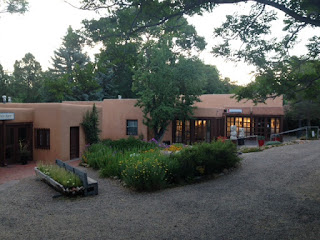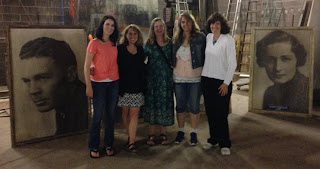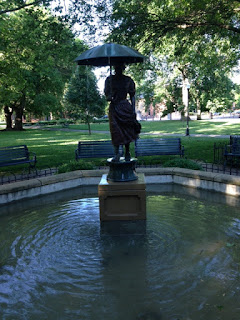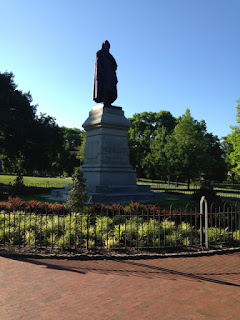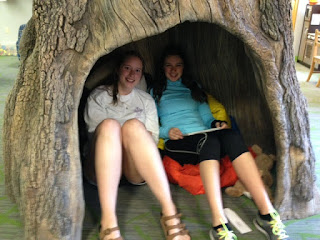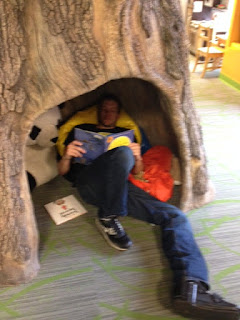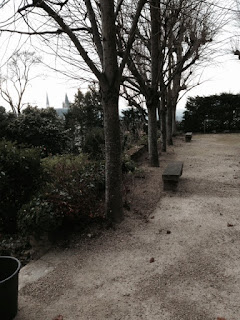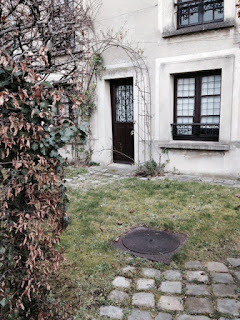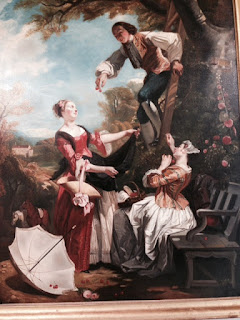new posts in all blogs
Viewing Blog: , Most Recent at Top
Results 26 - 50 of 294
Statistics for
Number of Readers that added this blog to their MyJacketFlap:
By: cmills,
on 7/11/2016
Blog:
(
Login to Add to MyJacketFlap)
JacketFlap tags:
Add a tag
A few months ago I got an email from the Rocky Mountain Division of the American Society for Aesthetics asking if I would give a keynote address at their summer conference in Santa Fe.
Well, I love giving talks, and I love Santa Fe. There was only one problem: I don't really know anything about aesthetics, or the philosophy of art. My area of specialization is ethics. I assumed that they had invited me by mistake, confusing me with some other better-qualified philosopher, and I wrote back to tell them so. They replied that they had indeed intended to invite me, hoping I could give them a "creative artist" talk on philosophy and children's literature. And I said, why, yes, that is exactly the kind of thing I could do!
The conference was this past weekend. Santa Fe is only a 6 1/2 hour drive from Boulder, so I invited my husband to come with me, and he accepted that invitation as well. But then I became consumed with doubt and guilt about how I would manage all my competing obligations: 1) give a good talk at the conference; 2) attend other sessions of the conference; 3) see an old friend friend from graduate school, a photographer/blacksmith/art historian who lives near Taos; 4) develop a new friendship with the wonderful, kindred-spirit philosopher who had invited me; and 5) make this a little holiday for me and my husband as well.
I really think I ended up doing all of those things. My talk was well received. I heard ten other talks and came away fired up to do more reading and maybe some writing as well on topics presented at the conference. I stole time for a leisurely lunch with the artist friend and had late night one-on-one heart-to-heart conversations with two other friends. I had dinner with my husband every night, and we also had a lovely drive up to Los Alamos to ponder the fascinating, tragic chapter of our national history that was the Manhattan Project to develop the atomic bombs dropped on Hiroshima and Nagasaki during World War II; he and I also savored the gorgeous scenery through the most gorgeous stretches of scenery in Colorado and New Mexico.
Sometimes it's a mistake to try to cram too much into too few days. Sometimes it's a mistake in life to try too hard to have it all. But this past weekend, I loved being able to combine work and play, professional development with deep, meaningful connections with friends old and new, plus family fun, too. I did have twinges of guilt for missing some conference sessions, but everybody misses a few. I did have a few pangs for abandoning my husband during most of each day, but we had more quality time together on the trip than we would have had at home. Best of all, I had long, quiet walks early each morning, all alone, past the art galleries on Canyon Road, time just for me. I had time, that is to say, for everything.
By: cmills,
on 7/2/2016
Blog:
(
Login to Add to MyJacketFlap)
JacketFlap tags:
Add a tag
All outings are fun, but for me, writing-related outings are the most fun of all.
Last night my writing friend Carrie organized an outing for her writing group, and me, to the abandoned theater that was once a prime attraction of the old Elitch's Gardens amusement park in Denver. Carrie is in the process of writing a young adult novel set in that theater, where she herself once worked many years ago, before Elitch's moved to its new location and the theater closed its doors for good. I was included in the outing as I'm going to be working with her in a mentor role as she tackles revisions.

Now celebrating its 125th anniversary, and in the midst of a decade of renovations, the theater is hosting tours on the First Friday of each summer month. The tour we attended was extremely well organized. Half a dozen different guides presented information about a wide range of subjects: the exterior of the building; the timetable for the restoration; the history of the Elitch family (with special focus on spunky Mary Elitch, who kept the amusement park, zoo, and theater going after her husband's early death); the history of the theater itself (the first summer stock theater in the U.S.); and the roster of visiting stars who had performed there, including Sarah Bernhardt, Robert Redford, and my own favorite, Patty Duke.
Here we are, soaking up atmosphere and looking forward to seeing some details from the theater's storied past making their way into Carrie's book:
Afterward we wandered over to Denver's delightful Tennyson Street, filled with its own First Friday delights. Tennyson Street is home to the Denver bookstore I love best, the charming children's bookstore,
Second Star to the Right.
They were still open, even at 9:30 at night, so I bought two books for Kataleya. Right across the street is another inviting bookstore for browsing and lingering,
BookBar, which offers the combined attractions of bookstore and wine bar. What's not to like about that? The
Denver Cat Company cafe was closed for the night, but several pleasingly plump kitties dozed in the window. After waiting for two of our party to have their Tarot cards read (!), we settled down for late-night people watching at an open-air, street-facing counter of a restaurant on the way back to the theater.
I got home close to midnight, unheard of for me, early to bed and early to rise as I am. But once in a while, it's worth it to burn the candle at both ends. Especially when you have the chance for a fascinating and fun outing with fascinating and fun writer friends.
By: cmills,
on 6/12/2016
Blog:
(
Login to Add to MyJacketFlap)
JacketFlap tags:
Add a tag
In the past few days at the Children's Literature Association conference, I crossed off several "bucket list" items, things that I wanted most to experience before I die. Strangest (and best) of all, these weren't even items on my actual bucket list, as they were things I had never dreamed were possible.
Although I'm a children's book author, I come to the conference each year as a children's literature scholar, presenting papers not about my own books but about books by other authors I've long loved: Louisa May Alcott, Laura Ingalls Wilder, Maud Hart Lovelace, Eleanor Estes, Betty MacDonald, Rosamond du Jardin. But this year, another scholar on the program presented a paper about me.
Prof. Jean Stevenson of the University of Minnesota-Deluth frequently presents papers drawn from her archival research at the Kerlan Collection at the University of Minnesota. It just so happens that I donate my own manuscripts to the Kerlan Collection. So this year Jean poked around into those materials and shared her findings in a conference session. It was bizarre, and humbling, to sit in the room and see my scribbled outlines, handwritten manuscript pages, and correspondence with my editor Beverly Reingold, there up on the screen of Jean's Power Point. I felt a bit exposed - appearing in public wearing only what ladies used to call their "foundation garments" - but mainly just so honored and grateful. Thank you, Jean, thank you, from the bottom of my heart for giving this loving attention to my work.
If that weren't enough, I gave my own presentation on my idol, Jeanne Birdsall, creator of the Penderwicks series. I was a judge of the National Book Award in 2005, in the category of Literature for Young People; Jeanne's first book in the series was our winner, and I think it's fair to say that I was the judge who loved it first and most.
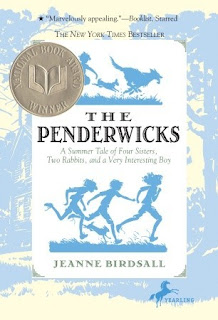
This year the brilliant scholar Anne Phillips of Kansas State University created a ChLA panel on the "family story in the 21st century," centering on
The Penderwicks, and invited Jeanne Birdsall to join us as the guest of honor
. So in the last session on the last day of the conference, I gave my paper, "Exclusive vs. Inclusive Families: L'Engle's Austins vs. Birdsall's Penderwicks," with Jeanne sitting right next to me.The hug she gave me afterward is something I'll take with me to my grave,
Then that evening, at the awards banquet, I received the organization's Edited Book Award for my collection,
Ethics and Children's Literature, a labor of love born out of a symposium I organized during my time at DePauw.
Shortly I'll fly back to my Boulder life, where I'll start dreaming and scheming about next year's ChLA conference in Tampa (theme: "Imagined Futures") and the year after that in San Antonio (theme: "Water"). But every conference for me has the theme "Happiness."
By: cmills,
on 6/9/2016
Blog:
(
Login to Add to MyJacketFlap)
JacketFlap tags:
Add a tag
Greetings from Columbus! I'm here attending the annual meeting of the (scholarly) Children's Literature Association conference. This might be the 20th one I've attended; certainly I've attended heaps and heaps, and in 2012-13, I served as the organization's president. This is always my happiest week of the year.
The conference officially begins today, but yesterday was the all-day meeting for the Executive Board (of which I'm no longer a member) and of the Phoenix Award Committee (on which I'm now serving the first of a three-year term). The Phoenix Award Committee gives an award to a children's book published 20 years ago which did not win a major award in the year of its original publication but is judged, by our committee, to merit one now.
I arose early and took myself on a delightful walk from our Sheraton hotel right across from the Ohio Statehouse to the picturesque neighborhood of German Village, with its historic houses and brick sidewalks.
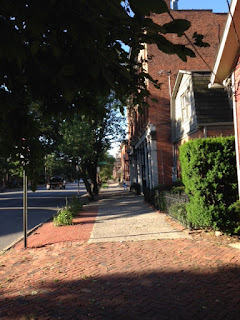
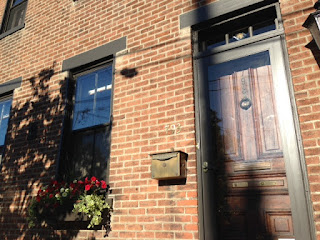
The walk terminated in Schiller Park: how many major American cities have a park named after a poet? Here is its charming "Girl with an Umbrella" fountain, as well as the imposing statue of Friedrich Schiller.
Of course, along the way I found a German bakery/cafe for hot chocolate and whipped cream, and cinnamon-crumb-topped coffee cake.
Back at the hotel, it was time to hurry to the Phoenix Committee meeting. All year long, I've been reading titles published in 1998 in preparation for deliberating about the 2018 award (we work two years ahead for various logistical reasons). By the time of the conference we were down to our ten finalists. We spent the entire morning lovingly discussing each one, celebrating its strengths, noting its weaknesses, and then reached a consensus decision on the winner. I'm not allowed to disclose it at this time, but trust me, it's a wonderful book, The rest of the day-long meeting was taken up in phone calls to the winners selected last year and plans for next year's festivities.
In the evening, I had dinner with two beloved once-a-year conference friends, and stayed up late talking to one of them about our shared love for Louisa May Alcott's
An Old-Fashioned Girl.All this before the conference actually begins, with the registration table open in another hour-and-a-half - just enough time for a quick walk to the German Village, and more hot chocolate, with more whipped cream....
Read the rest of this post
By: cmills,
on 6/6/2016
Blog:
(
Login to Add to MyJacketFlap)
JacketFlap tags:
Add a tag
Well, one day - ONE! - after posting my weepy, whiny complaint about how I can no longer find my golden hour of the early morning to write, I sat down with my little strategizing notebook and solved my problem, just like that.
The problem: my house is very small and very crowded, and my darling two-year-old toddler-in-residence now gets up unpredictably early. I've built my whole entire career on writing for an hour first thing in the morning. So it's now impossible to pursue my career as a children's book author, right?
Wrong!
To find my solution I began by listing all my woefully imperfect options, with my litany of reminders why each one wasn't going to work:
1) Get my hour later in the day - oh, but I hate not starting my day off with writing! Once that crucial early morning time slot has passed, it's too easy to talk myself into thinking I might as well do my writing "tomorrow."
2) Slip away to a cafe and spend my hour there - oh, but that would mean getting dressed, and driving somewhere, and spending money, and what if they don't have a comfy couch, or what if they do and some other author has already claimed it?
3) Get up at 4:00 - oh, but that's sooooo early, even for me!
4) Try to make someone else take care of Kataleya - oh, but her father is off at work and her mother has been up many times all night long with a newborn baby, and it hardly seems fair to rouse her again.
5) Let Kataleya fend for herself when she awakes - oh, but who could recommend that for a very active and mischievous two-year-old who every day finds a new way to foil our child-proofing?
6) Give up writing. I don't even need to list why this option is unacceptable to me.
I realized that I could stare at this list for the rest of my days, and it wasn't going to change. These are the options. I had to pick one of them. The best one, all in all, was #3. As my literary hero, Victorian novelist Anthony Trollope, wrote about his own pursuit of a writing career in tandem with a career in the British Post Office: "There must be early hours, and I had not as yet learned to love early hours." Okay. Early hours it would be, and I'd make myself learn to love them.
Unless. . . I reminded myself that actually Kataleya usually sleeps until 6 or 6:30 or even 7. There was only one morning - really, only one - when she was up at 5:30. It's true that now that I know she may wake up, I can't have the utter, spellbound, writing concentration of yore. But maybe I can talk myself into ignoring this dread possibility and write my best, anyway.
So, a new option appeared on the list:
7) Get up at 5:00. Don't check email. Don't check Facebook. Don't do anything but write as fully and fiercely as you can for one hour. If Kataleya wakes up during that hour, yes, it's a disappointment. But life has disappointments in it, and only whiny babies wallow in them.
Problem solved. This morning I got up at 5:00. I worked for a glorious hour on the keynote address I'm giving in a week and a half at the Writing and Illustrating for Young Readers workshop in Utah. I realized that I already had the talk well in hand from previous hour-a-day stints, so in today's hour of intense concentration I got the rest of it in good enough shape that, although I plan to do plenty of tweaking between now and then, if I had to give it tomorrow, that would be perfectly fine. Hooray!
Next time I have a vexing problem, I think I'll skip right over the self-pity stage and go straight to finding an imperfect but workable solution. I mean, why not?
By: cmills,
on 6/5/2016
Blog:
(
Login to Add to MyJacketFlap)
JacketFlap tags:
Add a tag
Many of you know that I begin a new life on the first day of each month, a life that will revolve around creative joy and dazzling productivity. For a few days, I do indeed dazzle myself, but then the new life peters out and I'm back to my usual slothful, sluggish ways. Still, I owe everything I've ever achieved to those first few days of each month times twelve months in the year.
This month my new life needs to be the newest new life ever. I really think I'm done with academia this time, done with juggling dual careers as college professor and children's book author, done with traveling back and forth between Colorado and Indiana, done with ripping my heart out as I make each transition. I'm back in Colorado to stay. My children's book writing career will finally come first. I've recommitted to my family. "This one," I've said, pointing to my Colorado life. "This is the life I want to live."
So now I have to figure out exactly how to live it.
My chief structural challenge is that I live in a very small house that is filled with many creatures whom I love, and who love me: one husband, one son, one-daughter-in-law, two adorable granddaughters (two years old and two-and-a-half weeks old), a needy dog, and an aging cat. I'm the chief dog walker and toddler-entertainer. I guess I'm the matriarch, the mover-and-shaker, or maybe, to switch metaphors, the stabilizing presence that keeps it all from moving and shaking apart. But I'm also, or at least I want to be, a writer. That's always been the biggest part of who I am.
My usual answer for how to juggle competing demands in my life has been to wake up at 5 a.m. and spend the first, best hour of the day writing. Then I can spend the rest of the day however the universe (or my employer, or my family) wants me to spend it. I've "paid myself first," and the books have gotten written, slowly, surely, at a pace that ensured victory for a certain famous tortoise.
Lately, however, this isn't working for me. Kataleya can wake up at 5 or 5:30, when her daddy is already off at work and her mommy is trying to get needed sleep after being up several times at night with baby Madilyne. I can no longer count on my undisturbed hour. Should I get up at 4 a.m.? That is awfully early, even for me. And there's something about being unable to COUNT on my hour that consumes me with such nervous anxiety that I can't write.
Obviously, the solution is to take an hour for myself LATER in the day, leaving the house to do it. That is truly all I need to do. Leave! Go somewhere else! For just one hour! I could go to the local branch of the public library, but they don't open until 10, and if 4 a.m. is too early, 10 a.m. is too late. I could go to the nearest cafe, but it doesn't have couches, and I love writing on a couch. I could accept offers from friends to come write at their houses, but it's so easy to slip into chatting instead.
One way or another, I have to find a way to get an hour for myself, say, from 8:30-9:30, on some convenient couch with hot chocolate handy. Surely this can be done. And if I do it, my NEW new life will be my best new life ever.
By: cmills,
on 5/23/2016
Blog:
(
Login to Add to MyJacketFlap)
JacketFlap tags:
Add a tag
I left Greencastle, Indiana, on Monday at 4:45 p.m. I completed the 18-hour drive, along scenic, un-trafficked Route 36, by 5:15 p.m. the next day, spending the night in Hannibal, Missouri, but taking no time to wander in Tom Sawyer's footsteps along the banks of the Mississippi. I was a woman with a mission: to get home in time to welcome my new little grandbaby into the world.
And I did.
Madilyne Jane Wahl was born on Wednesday, at 1:00 p.m.: 8 pounds, 8 ounces. I wasn't in the hospital room for her birth via Cesarean section because I was home taking care of now-big-sister Kataleya. Later that afternoon we met "baby sister" for the first time.
For the next three days I was Nanny Mimsie as Madilyne's parents were busy with her at the hospital. I did my best to give Kataleya a good time while we eagerly awaited Madi's arrival home on Saturday. (The photos are sideways, alas, for some unaccountable reason, and impossible to fix on Google Blogger, but if you turn your head you can see her sweet little self.)
We went to the park.

She rode the bus for the first time, to the university library, for me to get some books.
Finally, Baby Sister came home!
I'm so grateful this photo is posting right-side-up. If Madilyne Jane isn't Little Miss Huggable, I don't know who is. Welcome to the world, darling little girl. Mimsie loves you already.
By: cmills,
on 5/16/2016
Blog:
(
Login to Add to MyJacketFlap)
JacketFlap tags:
Add a tag
Today is my last day at DePauw. My students turn in their final work for the term at 5:00 p.m., and I start driving to Boulder at 5:01, in order to complete the 18-hour drive in time for the birth of granddaughter Madilyne Jane (via c-section) on Wednesday.
This last week - indeed, these last few weeks - have been filled with end-of-year celebrations of every kind. One thing this place excels at is displays of appreciation. I have never worked anywhere where I have felt so appreciated or been given so many opportunities to show my appreciation for others.
I attended the Senior Showcase, where the top graduates present their best work to an audience of faculty, parents, and peers. I beamed with pride at the Phi Beta Kappa initiation dinner where five of my students were inducted into membership. I happily accepted an invitation to a recognition ceremony at one campus sorority. Many of my students received end-of-year honors at the Academic Awards assembly. Faculty publications were heralded in a fat booklet shared at the Faculty Recognition Reception where half a dozen colleagues were feted with exquisitely worded 8-10 minute tributes for their recent books or other accomplishments. The Prindle Institute for Ethics sponsored an elegant dinner where students received prizes for papers in a range of disciplines focused on the discussion of ethical issues. President Brian Casey hosted an extremely fancy gathering at his home to announce faculty recipients of endowed chairs, where colleagues gave beautiful send-offs to retiring faculty with speeches that moved many of us to tears.
I thanked my students for a wonderful semester with parties in each class. After the immigration class party, one student asked me if she could meet with me briefly to discuss her final paper. She asked me a couple of halting, awkward questions for a minute or two - and then her two co-conspirators came bursting into my office with flowers, a cupcake, and a postcard of Greencastle so I would never forget them. One of them wrote on the postcard that if there were a Nobel Prize for teaching, I would get it.
This is completely untrue, of course. What IS true is that if there were a Nobel Prize for expressions of gratitude and appreciation, these students would get it, nurtured by a university culture that encourages all of us to take the time and make the effort to let others know how much they are valued.

By: cmills,
on 5/8/2016
Blog:
(
Login to Add to MyJacketFlap)
JacketFlap tags:
Add a tag
One of my regrets from this final semester (ever?) of teaching at DePauw is that I haven't made enough time to savor the charms of my adopted state. My first years here I was obsessed with exploring Indiana. I would stay up late reading Indiana guidebooks, too excited to sleep. My sister, then living in New Jersey, would come to Indiana on business, and we would have weekends crammed full of sister fun: outings to the former utopian colony at New Harmony, Lincoln's boyhood home, the early territorial capital of Vincennes, the stunning resort at West Baden Springs, museums in Indianapolis.
Now my sister lives right here in Indiana, just an hour away from me, but I've had less time for sister fun than I did before, given my heavier teaching load and more frequent visits home to Colorado. But with just two weekends left before I drive home to Boulder on May 15, sister fun could be postponed no longer.
So yesterday she and I headed to the Indianapolis Art Museum for their new exhibit honoring Indiana's bicentennial. What would be the most fitting way for an art museum to honor two hundred years of Indiana history and culture, you might ask. Why, a mini-golf course on a rooftop plaza with each of the 18 holes designed by an artist in celebration of some aspect of this state's life and lore, of course.
The first hole honored the Great Squirrel Invasion of 1822, a moment from Indiana's past that I must confess had not been on my radar.

I did not succeed in getting my ball to drop out of President Benjamin Harrison's mouth.
My ball did ping off the chimes set to play "Back Home Again in Indiana."
Naturally one hole depicted Indiana's patchwork quilt of farmlands:
And another showcased its covered bridges.
Cheryl and I are both decidedly non-athletic, and even though the little buttons we were given to wear proclaimed that mini-golf was "like a sport, only easier," we were both very bad at it, which only added to the hilarity. Candor compels me to confess, however, that she beat me by three strokes in the end.
I've so loved being Hoosier sisters! But even if, in another two weeks, we'll no longer be living in the same state, we'll still be sisters, and silly sisters, forever.
By: cmills,
on 4/30/2016
Blog:
(
Login to Add to MyJacketFlap)
JacketFlap tags:
Add a tag
A Princeton University professor named Johannes Haushofer recently made news by publishing a "c.v. of failures," a public list of his rejections for graduate programs, jobs, fellowships, and publications. It's gone viral, as we all need to hear stories of others' failures to counteract social media's incessant celebration of others' success.
This year I've had my own share of professional failures. Here are a few:
1) rejection of a proposal for a new chapter book series from my publisher, after early encouragement
2) rejection of a proposal to speak at our Rocky Mountain Chapter of the Society of Children's Book Writers and Illustrators, after I had been personally invited by one of the Co-Regional Advisers to apply
3) a SECOND "revise and resubmit" verdict on the same children's literature article from a prominent journal
4) disappointing spring royalties (reflecting disappointing sales) on several recent recent books
5) small audiences at the Children's Literature Festival that I attend every year in Warrensburg, Missouri.
I could add more, but I think I've made my point depressingly clear, or at least depressingly clear to myself.
So my question is, what do I do now?
One answer, of course, is try, try again. But "try, try again" isn't going to work if I just try the very same thing over and over again while expecting different results. We've all heard that as the definition of insanity. In other equally familiar words: "If you do what you've always done, you'll get what you've always gotten."
Actually, for most of my career I've liked what I've gotten. I've never been wildly ambitious for fame and fortune. I just wanted to be able to do work I love, maybe even make a modest living doing it, and get to spend time with other fun, creative people who are also doing work they love. And I've been lucky enough to achieve those things.
But the world of children's book writing and children's literature scholarship has gotten increasingly competitive, with brilliant new, young authors and scholars joining their ranks. If I want to stay in the game, I'm going to have to step up my game. If I do what I've always done, I'm not going to be getting (even) what I've always got.
So now I have to decide: how bad do I want it? Do I want it enough to work harder than I've ever worked before? Do I want it enough to bite the bullet and accept that I need to (1) become a better writer; and (2) become a better self-promoter (rather than spending time complaining that kids thirty years ago liked my books just fine and that authors thirty years ago didn't have to have websites, Twitter accounts, or glitzy giveaways)? Do I want it enough to sit down, once this final semester of teaching ends, and seriously try to reinvent myself for the 21st century, now that we are already 16 years into it?
I don't know. Part of me wants to. Part of me doesn't.
Part of me thinks that writing is what gives my life its deepest satisfaction so that I should do whatever I need to do to hold onto it as long as I can - clinging not just to writing, at home, alone, for myself, but to being part of the world of writers, to belonging in that world. Another part of me thinks that the idea of putting myself out to pasture, after 35 years in harness, is not a completely terrible thing, especially with two little granddaughters to cuddle, one already here and one set to arrive in another three weeks.
I think the bigger part of me wants to try better, try harder, try fresher, try smarter. The pasture isn't going anywhere; it can wait for me a little longer.
Either way, whether I continue to flourish and thrive in this business is going to depend on how badly I want it, and whether I'm willing to back up my wanting with working.
By: cmills,
on 4/24/2016
Blog:
(
Login to Add to MyJacketFlap)
JacketFlap tags:
Add a tag
Last week my children's literature class had one of its highlights: our "class trip" to the children's room at the Putnam County Public Library.
One of the things I love best about my life in tiny Greencastle (pop. 10,000) is how compact everything is. It's literally one short block from Asbury Hall on the DePauw campus, where I teach my class, to the public library (and two short blocks from there to the courthouse square, i.e., "downtown"). So I can have an outing to the library during a class period and still have the students arrive on time to their next commitments.
Our wonderful children's librarian, Krista Mullinnix, was ready for us, with appealing new picture books laid out on the low tables in the "Maker Space." Her presentation to us highlighted some of her favorites, and now I have a list of great new-to-me titles to share with Kataleya when I return home in a few weeks:
Rhyming Dust Bunnies by Jan Thomas,
Press Here by Herve Tullet, and
Waiting by Kevin Henkes. Krista made me be the one to read aloud the hilarious, but embarrassing-for-the-one-reading aloud, picture book
The Book with No Pictures by B. J. Novak. I saw several students in tears as they later read silently
Ida, Always, by Caron Lewis, based on the true story of two Central Park Zoo polar bears, inseparable until death. (I'm going to wait a while longer to share that one with Kataleya.)
Best of all, though, was just being in the space of this library's enticing children's room, getting to enter through an extra-tiny door and then curl up reading inside a hollow tree trunk or on a cozy window seat.
What's better for children's literature students than to have one sweet hour to be a child again?
What's better for any of us?
By: cmills,
on 4/17/2016
Blog:
(
Login to Add to MyJacketFlap)
JacketFlap tags:
Add a tag
The semester which stretched before me as a blank stretch of new-fallen snow back in February now has just four weeks of classes before we head into finals week. Daffodils, tulips, magnolias, and red bud are in bloom, and the first lilacs are beginning to perfume the air.
In my children's literature course, we've covered the emergence of children's literature as a genre, fairy tales, three touchstone texts (Alice in Wonderland, Peter Pan, The Secret Garden), fantasy (Harry Potter, of course, the students' favorite week of the semester), historical fiction (Little House on the Prairie by Laura Ingalls Wilder and Morning Girl by Michael Dorris), contemporary fiction (The Absolutely True Diary of a Part-Time Indian by Sherman Alexie), and to continue the theme of the need for greater diversity in children's literature, the beautiful verse memoir by Jacqueline Woodson, Brown Girl Dreaming. Next up, picture books, and then we'll celebrate the final week of the course with humor via Captain Underpants.
In the ethics of immigration policy class, we've explored the philosophical debate between advocates of closed borders and advocates of open borders; we've argued about various definitions of "refugees" and what is owed them by wealthy, peaceful, privileged nations such as our own; we've debated how to respond to the presence of the 11 million undocumented migrants in our midst. We'll finish the course with a look at how race and gender inflect patterns of migration and raise their own ethical issues.
Finally, in my sweet, seven-student Honor Scholar class on what I'm calling "The Ethics of Story," we've consumed ourselves with issues of truth and betrayal in the writing of memoir and investigative journalism, as well as trying to develop our own positions on the question of when the exchange of stories across cultures becomes ethically problematic cultural appropriation or cultural imperialism. This coming week we'll launch our look at censorship by reading the novel that occasioned the most famous censorship court case of the 20th century, Lady Chatterley's Lover by D. H. Lawrence.
Just four more weeks! Then I'll say goodbye to my students and drive back to Colorado to say hello to a new granddaughter, due to enter the world the very same day I'm due to arrive home.
My teaching has been so all-consuming this semester that I've written less than I've ever written at any time in the last 35 years. I've decided this has to change. Like my students, I need to make one final push to get my own work done for the semester. My goal is to have a book proposal (synopsis and several chapters) ready to send to my editor by the middle of May.
Wouldn't it be lovely to bring my semester to a close by welcoming both a new baby and a new book-in-progress? The baby is coming, ready or not. But the book will come only if I make that my priority for the next month. So amid thoughts of picture books, race and gender in immigration policy, and the rights and wrongs of censorship, I'm committing to myself here and now to make time to write.
How much time?
Why, an hour a day.
By: cmills,
on 4/10/2016
Blog:
(
Login to Add to MyJacketFlap)
JacketFlap tags:
Add a tag
I am currently teaching the hardest course I've ever taught, a philosophy department course on "The Ethics of Immigration Policy." It's hard because the material is new to me so I'm learning along with the students; it's hard because the philosophical questions here are extremely challenging (I chose to teach the course in part because I didn't yet know what I thought about them); and it's hard because the controversial nature of the material in a class that is so diverse in terms of students' political views and relevant life experiences can make discussions a teensy bit tense and uncomfortable.
But it's also one of the easiest courses I've ever taught, as the material offers nonstop opportunities for course enrichment. So my tip to my future self, should I ever teach such a course again, is: Find these opportunities and seize them. Don't worry if you're diverting too much class time away from standard lecture-and-discussion. Pounce on every chance to make the material come alive for the students in every possible way.
For this particular course, these opportunities include:
1) Guest lectures from colleagues with vastly more expertise than I have in the empirical background for these issues. So far we've had Prof. Glen Kuecker (Central American History) on the sources of migration to the U.S. from Mexico and Guatemala, and Prof. Brett O'Bannon (Conflict Studies) on international refugee conventions. Next up: Prof. Oscar Gil-Garcia (Sociology and Anthropology) sharing his case study of a "coyote" helping migrants across the Mexican-U.S. border, and Prof. Christina Holmes (Women, Gender, and Sexuality Studies) on gendered dimensions of migration.
2) Films that bring to life the stories of the real people behind immigration statistics. I was only going to show one film in class, God Grew Tired of Us, about the Lost Boys of the Sudan. But I allowed the students to talk me into screening a second film, Documented, in which Pulitzer-Prize-wining journalist Jose Anthonio Vargas outs himself as undocumented migrant from the Philippines. In addition, I'm requiring students to watch one additional film outside of class; I did a screening last week of the first option, the heartbreaking 2007 fictional film The Visitor.
3) Extra credit for an array of fascinating talks on campus: a lecture by Rights Watch activist Grahame Russell; a conversation with former Congressman Lee Hamilton who helped craft the United Nations doctrine of "Responsibility to Protect"; and a talk by Earlham College Professor Thomas Hamm on parallels between the attitudes that made possible the Japanese internment during World War II and responses to Syrian refugees today. I also learned this morning that Gobin United Methodist Church on campus is hosting a luncheon after worship next week with a presentation by a Syrian refugee family, with a Syrian vegetarian feast. Extra credit plus fabulous food!
We've also heard a presentation from one student in the class on the eight years she spent in a refugee camp in Thailand, after her family fled persecution for their Mon ethnic identity in Burma. I'm working on organizing one more presentation by Exodus, a refugee-resettlement group in Indianapolis.
With the exception of the extra credit talks, each of these takes valuable class time (and even with the outside-of-class talks I give students class time to share their reactions). But at the end of the day, at the end of the semester, at the end of their lives, which will students remember more? Yet another class discussing yet another chapter of our (excellent) primary text, The Ethics of Immigration by Joseph Carens? Or a powerful guest lecture by someone who has spent a whole career thinking about recent Central American history or about our responsibilities to refugees, or the wrenching testimony of a refugee classmate?
So the class is hard in some ways, but wonderfully easy in others. If I ever teach it again, may it be in another environment in which so many enrichment opportunities are available, and with the courage on my part to embrace them.
By: cmills,
on 3/31/2016
Blog:
(
Login to Add to MyJacketFlap)
JacketFlap tags:
Add a tag
Today is the day before April.
I've blogged several times about this favorite poem of my childhood by Mary Carolyn Davies.
The Day Before April
The day before April
Alone, alone,
I walked in the woods
And sat on a stone.
I sat on a broad stone
And sang to the birds.
The tune was God's making
But I made the words.
My mother, my sister, and I have long celebrated "the day before April" as a special Mills family holiday. I always think of them both on this day, although my mother is no longer living. My sister sent me a "Day Before April" email greeting before dawn this morning.
The magic of the Internet is that over the years other lovers of this poem have found my past posts on this special day and confided to me how much this same poem meant to them and their families throughout their childhood and on to adulthood. With her permission, I'm sharing the beautiful message I received via email from Barbara McMichael a few hours ago:
I just stumbled upon your blog post from a couple of years ago about
celebrating the day before April - I was so happy to see it - it's been
a tradition in my family, too, for as long as I can remember. Sixty
years ago, my parents bought a piece of property outside of Seattle and
designed and built their own home. They kept much of the woodland, and
there is a particular flat rock that we always used to go sit on to
recite the poem. When I went away to college, I had to seek out rocks
elsewhere, but I usually was able to find something.
After my parents passed away, the original April Stone (as we called it)
had become overgrown. But over the past couple of years I've been
whacking away at the blackberries and restoring the woodland, and this
morning I was able to go sit on the stone, recite the poem and
commune with the birds for a few moments of springtime bliss. I'm so
glad to know there are others out in the world who are enjoying this
particular day, too. Hooray for the power of poetry!
Indeed.
By: cmills,
on 3/23/2016
Blog:
(
Login to Add to MyJacketFlap)
JacketFlap tags:
Add a tag
I have spent my whole adult life simultaneously pursuing three different careers: 1) children's book author; 2) children's literature scholar; and 3) philosopher professor specializing in teaching and writing about ethics. The older I got, the more the three began to converge: I used children's literature examples in my Intro to Ethics class; I published scholarly articles about ethical themes in children's literature; I gave my fictional characters ethical challenges to face.
When I came to the Prindle Institute for Ethics at DePauw University in the fall of 2011, my three professional loves finally melded into one. I taught a course on my beloved Jean-Jacques Rousseau (himself a novelist and theorist of childhood) for the Philosophy Department, but also taught children's literature (for the first time in my life) for the English Department. I organized a symposium on Ethics and Children's Literature, where philosophers, children's literature scholars, and children's book authors came together for three idyllic days, sharing our papers and talking in the beautiful setting of the Prindle Institute.
From that symposium grew a book,
Ethics and Children's Literature, under the encouragement of brilliant editor Ann Donahue at Ashgate Press, who published it in Ashgate's "Studies in Childhood, 1700 to the Present" series. (The cover image is an illustration from an early edition of Rousseau's
Emile.) Making the book was a labor of love, for it is a tangible representation of the union of my three careers, brought together in one volume.
This week I learned that the book just won the Children's Literature Association's Edited Book Award for an "outstanding edited collection of essays in children's literature, history, and criticism," selected from a field of almost forty titles published in 2014. Earlier I also learned that one of the chapters in the book, "The Rights and Wrongs of Anthropomorphism in Pictures Books," by Lisa Rowe Fraustino, won the Children's Literature Association's Article Award for the best scholarly article published in 2014. Lisa is my dear, dear friend, and now she and I will sit together at the awards banquet at the June conference, held this year in Columbus, Ohio.
Few things in my life have made me happier than this recognition, from peers I respect, eminent scholars in a field of study to which I have blissfully devoted the past two and a half decades of my life. I think of Marmee's final line at the end of
Little Women: "Oh, my girls, however long you may live, I never can wish you a greater happiness than this!" I'm sure other happiness, and sorrow, will come my way. But this is a week I'm going to remember with great fondness for the rest of my days.
By: cmills,
on 3/18/2016
Blog:
(
Login to Add to MyJacketFlap)
JacketFlap tags:
Add a tag
One day this week, here at little DePauw University in tiny Greencastle, Indiana, I attended not one, not two, not three, but FOUR talks (in addition to teaching a class on Harry Potter in my children's literature course and a class on climate change refugees in my ethics of immigration policy course).
11:30-12:30 Luncheon talk on narrative medicine with Dr. Owen Lewis, professor of psychiatry at Columbia University. "Narrative medicine" makes use of writing about illness by physicians, patients, and family members to deepen understanding and promote healing. Lewis read aloud a piece of writing by one of his medical students about the day she "met" her cadaver; in the piece the writer notes the red nail polish on the fingernails of the woman whose corpse she is going to be dissecting and wonders about the circumstances that led her to apply it with such care.
4:00-4:45 Craft talk on songwriting by young singer/songwriter (and DePauw graduate) David McMillan of the indie band Fort Frances. Here is the best advice he ever received in his writing/performing career: "Your last album was great! Don't ever do anything like it again!"A stimulating call for constant creative self-invention.
7:00-8:00 Talk by Buzzfeed journalist Anne Helen Petersen: "Too Loud, Too Fat, Too Slutty: The Rise and Reign of the Unruly Woman." This one was absolutely packed with students who wanted to hear a media analyst talk about the dominance of a new kind of female celebrity, a woman who defies (but sometimes also reinforces) cultural norms by being transgressively "too much" of something. I had never heard of any of the figures she was discussing - Lena Dunham, Amy Schumer, the characters of a raunchy TV show called "Broad City" (where apparently Hillary Clinton is set to make an appearance!) - but it was fascinating to get this glimpse into pop culture.
8:00-9:30 Talk by theologian Candida Moss of Notre Dame on the topic of "Heavenly Bodies: Disability, Infertility, and Bodily Values in Early Christianity."The talk explored the early Christian church's attempt to understand resurrection of the body, which necessitated speculation about what resurrected bodies might be like. Presumably we wouldn't get our same, decrepit-at-death bodies back post-Resurrection, but some idealized form of our bodily selves. But idealized, how? Moss examined the ways in which the early church constructed a vision of idealized bodies that implicitly denigrated bodies that were black, female, or disabled.
Okay, this wasn't really a typical day for me here at DePauw. Even as someone who tries to go to just about everything that is intellectually and creatively rich and stimulating, I broke my own record for talks attended in one twelve-hour period. But it was an amazing day. Will I ever again hear talks about fingernail polish on a corpse, songwriting advice, celebrity gossip, and speculations about the nature of Christian resurrection, all in one day?
Most certainly, not.
By: cmills,
on 3/16/2016
Blog:
(
Login to Add to MyJacketFlap)
JacketFlap tags:
Add a tag
This is the week my children's literature students have looked forward to since the start of the semester almost seven weeks ago: our three classes discussing the best-loved text of their childhood, Harry Potter.
We're situating the series within the genre of the British boarding school story, which first began with
Tom Brown's School Days by Thomas Hughes, published in 1857 - a book that featured life at a boarding school (the actual, real-life school of Rugby), with competition between houses to excel at a relatively novel sport (guess which one?) under the guidance of a charismatic headmaster. We're also analyzing striking parallels between the opening of
Harry Potter and the Sorcerer's Stone and the opening of
Peter Pan, with the Darlings and the Dursleys both obsessed with respectability before some magical force "breaks through" into their humdrum reality. We're talking about Harry Potter as a Cinderella story with one student also uncovering similarities between Harry Potter and Snow White. And we're seeking to understand the series' unprecedented worldwide popularity.
As part of our foray into the universe of Harry Potter fandom, we all trotted home after Monday's class to get ourselves sorted into Hogwarts houses on the
Pottermore website, which the most die-hard fans among us declared to be the best. I had never done this before, confident that I would be placed in Ravenclaw, "where those of wit and learning will always find their kind." After all, young Rebecca who came with us on our Winter Term Enchanted Spaces trip had assured me I was definitely a Ravenclaw, because I'm so smart and creative (thank you, Rebecca!).
But when I took the Pottermore Sorting Hat quiz, the hat did not place me in Ravenclaw.
It did not place me in Hufflepuff, although I consider myself to be loyal and true.
I doubted it would place me in Gryffindor because I'm not particularly brave of heart, and sure enough, it didn't.
No.
The Sorting Hat placed me in Slytherin.
Slytherin!!
I couldn't believe it. So I scurried over to a competing Potter fandom website and took a different quiz for my house placement.
Slytherin AGAIN!
I took a third quiz on a third website and finally, FINALLY, got Ravenclaw, but I have to admit I didn't give the answers that first popped into my head, but strained to find the ones that seemed most Ravenclaw-ish.
Worse, when I confessed my result to the students today, several of them said that they could "totally see it"!
Now, I was comforted by noting a number of other Slytherins in the class. Indeed, we seemed pretty evenly sorted, with perhaps a small edge for Ravenclaw and a slight paucity of Gryffindors. And my fellow Slytherins don't seem at all like Draco Malfoy and his thuggish sidekicks, or like greasy Snape, or the dazzlingly evil Voldemort.
But still.
I've been rethinking the quiz questions all day. What made the Sorting Hat choose as it did? What question most marked me? I think perhaps it was my answering that I wanted to be thought "original," when I could have answered "intelligent" (thereby sending me to Ravenclaw?). I've never sought power, or at least I don't think I have, but I've coveted fame, as a writer, panting after starred reviews and placement on "best of year" lists. I don't think I've ever done anything untoward to secure these accolades, and goodness knows, I've secured very few of them. But I've yearned for glory, I know I have.
Oh, Sorting Hat, do you know me better than I know myself? I have to admit I'm taking this quite hard, pondering my entire life in light of two verdicts from a series of half a dozen multiple choice questions on two fandom websites.
Slytherin. Well, well.
By: cmills,
on 3/13/2016
Blog:
(
Login to Add to MyJacketFlap)
JacketFlap tags:
Add a tag
Today is my least favorite day of the year: the day we change the clocks for Daylight Savings Time.
And this least favorite day of the year is my MOST least favorite in Indiana.
Non-Hoosier friends may not know (I didn't know until I moved here) that Indiana is not on Central Time, as right-minded people would expect, but on Eastern Time. That is to say, we are in the wrong time zone. Here in Greencastle, on the western edge of the state, we're pretty much due south of Chicago, which is on Central Time. We're actually farther west than Nashville, which is on Central Time.
It is dark here in the mornings. As in: dark. It's also cloudy here much of the time, so even when the sun does rise, the morning isn't what you could call bright and sunny.
Each day as spring approaches, and it's a little bit lighter in the morning, my heart rejoices. I feel the same joy from the morning's paler sky that I feel when I see crocuses pushing their way through last year's dead leaves or daffodils beginning to open their tightly furled golden flowers. Spring is on its way!
Except that I know that horrid day is coming, when we change the clocks ahead one hour, losing not only one sweet precious hour of our lives which we won't regain until the fall, but everything we gained from all those lightening mornings.
It's dark in the morning all over again.
How dark? This morning - I looked this up - the sun rose here at 8:01.Yes, the sun doesn't rise here until after eight o'clock!
Of course, we get those long, light, Indiana evenings. But I'm not an evening person. I'm a morning person. I'm one who rises each day and says with Emily Dickinson:
Will there really be a "Morning"?
Is there such a thing as "Day"?
Could I see it from the mountains
If I were as tall as they?
The only consolation I can offer myself is that at least now the worst has happened, we've lost that cherished hour of morning light, so from now on, every day will really be another day of progress, genuine promise, with a minute more of light each morning. And this time not light that will snatched away by some cruel clock-shifters, but light that we can keep for good. It's sort of how I actually look forward to finding out the terrible financial hit I'll take on taxes (always around this same time of year). I might as well find out the worst, face it whatever it is, pay it whatever it costs, and then start saving all over again.
So it's heartbreakingly dark this morning. But it will be lighter tomorrow, and lighter still the day after that. The dogwood will bloom. Easter will come with its hallelujah of resurrection.
I'll give the last words to Emily:
Oh some Scholar! Oh some Sailor!
Oh some Wise Men from the skies!
Please to tell a little Pilgrim
Where the place called "Morning" lies!
By: cmills,
on 3/6/2016
Blog:
(
Login to Add to MyJacketFlap)
JacketFlap tags:
Add a tag
I wanted a teaching challenge for myself this spring, and I got one: I'm teaching a new course that I've never taught before, a course for the DePauw Philosophy Department on the Ethics of Immigration Policy. I wanted to teach it because the topic couldn't be more timely and urgent, with the heated presidential election rhetoric as well as the heart-wrenching refugee crisis erupting every day in Europe. And I wanted to teach it because I don't think there are any easy answers here, philosophically, politically, or practically, and I prefer teaching courses that pose genuinely hard questions for my students - and for me.
Well, that is definitely what I've gotten.
So far we've discussed the debate between philosophers like Joseph Carens, who defends the view that democratic commitments to freedom of movement and equality of life chances commit us to open borders between nations, and philosophers like Michael Walzer, David Miller, and Christopher Wellman, who argue that, like individuals, nations have a right to freedom of association, and that meaningful community is not possible without some closure of boundaries. The students wrote their first paper on this topic. Despite a first-day-of-class survey that showed almost no support for the open borders view, 12 of 20 ended up defending that view in their papers, with 8 of 20 defending the status quo that is our political reality. (Of course, one student told me that he didn't actually believe the view he was defending in his paper, that he likes to write papers arguing for views he doesn't hold!)
This past week we've been talking about what our admissions priorities should be in a world of at least partially closed borders. Family reunification? Advancing our own national interest through recruiting highly skilled foreign workers to strengthen our economy? Compensating those harmed by wrongful U.S. governmental policies that rendered their native lands all but unlivable? Next week we'll begin looking closely at the category where admissions seem most clearly morally obligatory: refugees.
Here are two things that are making the teaching of this course extra hard.
1) Each day brings new real-world developments I feel that the class - and I - should be keeping abreast of. To address this, I've instituted "Current Events Fridays" where teams of students present something from the news for our collective edification.
2) The issues we are discussing connect deeply with the actual lives of some of the students in the class. At least one student is a refugee: she told me her family came to the U.S. as refugees from Myanmar (Burma). Another student may be an undocumented migrant (a classmate told me this). So when other students defend not-unreasonable views that support stringent limitations on immigration, these views are not just abstract philosophical ideas; they are views that impact the lives of real people -including real people in our own class.
This latter challenge is tougher to deal with. I don't want to silence robust, wide-open debate where all respectfully presented views get a hearing. But I also don't want vulnerable students to feel unwelcome in our midst. So far the main thing I've done to address this situation is to have a guest lecturer to the class, a colleague who specializes in recent Central American history. He shared a heart-breaking story about a former DePauw student who was an undocumented migrant, deported shortly after graduation: taken down to El Paso and walked across the border to Mexico, with nothing but the clothes he was wearing, this although he hadn't lived in Mexico since he was three years old. That student, Daniel, has now died, either from suicide or as a victim of gang violence.
The students were visibly moved by this story. I was, too.
I console myself by the thought that even if it's hard to balance competing factors in designing and teaching a course like this, at least I'm trying. It's better to create a space where we can learn about these enormously difficult issues than to avoid engagement with them altogether. It's better to educate ourselves, and to try to formulate reason-based arguments while also allowing ourselves to experience the emotion any decent human being would feel from a story like Daniel's.
So that's what I'm doing this semester, each Monday, Wednesday, and Friday from 12:30-1:30.
By: cmills,
on 2/28/2016
Blog:
(
Login to Add to MyJacketFlap)
JacketFlap tags:
Add a tag
I'm home in Colorado from Indiana for a long weekend to celebrate my granddaughter Kataleya's second birthday. Here is the photo montage that her mother, Ashley, assembled for the occasion:
It's an awfully vivid way to demonstrate how swiftly time passes and how much each second counts.
I've decided that after this semester at DePauw finishes in May, I'm not going to seek or accept prolonged teaching appointments far away. I withdrew my application to teach for Semester at Sea, which would have involved teaching three courses on board a cruise ship sailing to ports in Japan, China, Burma, Vietnam, India, Ghana, South Africa, and Morocco. I still have a commitment to teach for six weeks in the summer graduate program in children's literature at Hollins University in Roanoke in the summer of 2017. But except for that, my plans now are to stay closer to home.
I feel a little bit like Professor Harold Hill at the end of
The Music Man, the traveling conman who decides not to flee River City after he falls in love with librarian Marian. "Well, for the first time in my life," he says, "I got my foot caught in the door."
Having a little grandbaby here in Boulder, and another on the way in May, I've gotten my foot caught in the door. While I'm certainly going to keep a valid passport close at hand, escape no longer beckons with the same allure.
I've never been the kind of person who believed that family was everything. Indeed I wrote
a post on this blog a few years ago that staunchly maintained the opposite, and I still stand by every word of it. I'm not someone who thinks that on my deathbed all I'll care about is the time I spent with my family. On my deathbed I'm going to be proud of the books I've written and the students I've taught. I have loved being a writer as much as I've loved being a mother, and now a grandmother. There, I've said it again.
But here's the thing. Lately I haven't been much of a writer. With all the work to prepare the three courses I'm teaching this spring, two of which I've never taught before, and now teaching those same three courses, five days a week, I've crowded writing out of my life. The person who gives inspirational talks on how she writes all her books in just an hour a day while working hard at another full-time job isn't writing much at all. I've chosen to focus on what's urgent now - getting ready to walk into the classroom prepared for class tomorrow - over what's more important to me in the long run: writing books. I love teaching, I do; but I love writing more.
So in choosing home over faraway adventures, I'm not just choosing time with a sweet, stubborn, funny, naughty, adorable little grandchild over a full and flourishing career. I'm choosing
both the people I most want to be with
and the work I most want to do.
I'll still have a heart that seeks and needs and loves both work and family. But for the foreseeable future, at least, I want to love both
of them
here, in this one place.
By: cmills,
on 2/14/2016
Blog:
(
Login to Add to MyJacketFlap)
JacketFlap tags:
Add a tag
I recently had a book proposal rejected by the publisher with whom I've worked closely and lovingly for some twenty years. The proposal was for a new chapter book series, with four books outlined, which means that technically, it's four rejections in one.
I've had rejections before, of course. Every author has. But this one scared me more than usual. This time I don't have that steady paycheck from the University of Colorado Philosophy Department; instead I have a small monthly stipend from the early retirement package I accepted. At this moment, I have my DePauw University salary, but my past gigs here were as a distinguished visiting professor; given that it was well past time for someone else to have a turn at that opportunity, I'm here this semester as a paid-per-course adjunct. And after this, I ain't got nothing.
Worse, right now I don't have any wonderful next idea to submit. Indeed, the reason why the recent proposal was (rightly, in my view) turned down is that even it wasn't all that terrific.
So I'm a teensy-weensy bit terrified about: 1) money; 2) my career; and 3) the rest of my life.
Then I went to church this morning, to Gobin Memorial United Methodist Church here on the DePauw campus in Greencastle. It's the first Sunday in Lent, the forty-day period of penitence and introspection leading up to Jesus's death and resurrection. I took one look at the church bulletin, and I knew that in some strange way everything was going to be all right.
The service was titled "Gifts of the Dark Wood."
The opening music offered these sung lines:
There's a path, though it winds its way through darkness.
We would choose to avoid it if we could.
We awake to an unexpected calling.
God says, 'Come, there are gifts in the Dark Wood.'"
I love having a name, and such a beautiful one, for this groping, lost time in my career/life. I'm in the Dark Wood. But there are gifts in that wood, gifts for all of us, gifts for me.
Later in the service we heard the story from the Gospel of Mark when the hemorrhaging woman, failed by all other healers, touches the hem of Jesus' garment, and the bleeding halts. We were asked to write down what it is that we need to be healed from, in this Lenten season, then to tear up the paper and place the scraps in a basket by the altar, taking with us one strip of fabric to remind us that we, too, can reach out and touch the robe of Jesus.
I won't say exactly what I wrote on my piece of paper: that's between me and God. But I felt more at ease in the Dark Wood after I surrendered it.
Even the Dark Wood can be a beautiful place to wander.
By: cmills,
on 2/12/2016
Blog:
(
Login to Add to MyJacketFlap)
JacketFlap tags:
Add a tag
I'm back to loving my life in Indiana with a grateful heart. Here is one of the reasons why.
The DePauw University School of Music stages an opera production every year, and this year's selection is the 1998 opera by American composer Mark Adamo,
Little Women. At a small liberal arts college like this, it isn't sufficient just to produce an opera. Oh, no. There must be all kinds of opportunities for campus-wide engagement with the piece.
Last fall the DePauw film series screened the 1994 film version of
Little Women with Winona Ryder as Jo, which I was unable to attend as I was off campus in Boulder that semester. But last week I attended the talk by YA author Michaela MacColl about her fictional depiction of young Louisa May Alcott, T
he Revelation of Louisa May (hosted by the Putnam County Public Library, to get the larger community involved in all our Alcott enthusiasm). Next week I'm looking forward to a lecture by historian Robert A. Gross on Alcott's life and work situated within the history of her hometown, Concord, Massachusetts.
As I savored the campus's
Little Women festival featuring the opera of
Little Women, film of
Little Women, recent historical fiction making use of
Little Women, and scholarly lecture on
Little Women, I asked myself, "Hmm. What is missing here?" Yes: reading the actual book of
Little Women! So I organized a reading group sponsored by the Prindle Institute for Ethics. The reading groups meet in the evening by the beautiful fireplace in the Prindle's Great Hall; the Prindle purchases the books for all the participants as well as wine and an array of lovely snacks.
Our group, composed of faculty from Philosophy, French, History, English, and Classics, as well as staff from admissions, the university science library, and other campus units, met for the first time last week to discuss the first half of the text. Some had never read
Little Women; others hadn't read it since childhood; some were reading it yet again as a beloved oft-visited friend. I did force everybody to postpone the topic we wanted to talk about most: should Jo have married Laurie?! That will be the centerpiece of next week's meeting on the final half of the book.
I chose for us the Norton Critical Edition of the text, so our third meeting will focus on selected scholarly and critical essays included there. Our final meeting with involve a Skype visit with one of the Norton Critical Edition's editors, the brilliant and generous Anne Phillips of Kansas State University. In between the second and third meetings, we'll have time to go together to see the campus production of the opera.
But here's the best part. Two of the students in my seven-person Honor Scholar course on "The Ethics of Story" are School of Music voice students, and both have roles in the opera: one as Laurie, one as Mr. March. This week the composer himself is here on campus doing intensive coaching of the students in their roles. "Laurie" invited me to come sit on his coaching session. He sang the role so beautifully and became Laurie so completely before my eyes that I was sure Mark Adamo would find no suggestions at all for improvement, but of course Mr. Adamo had suggestions on every syllable. It was fascinating to see such attention to the details of each breath, phrasing, and gesture.
Now "Laurie" and his real-life girlfriend who is playing Jo (!!!) are going to join us at the third meeting of the
Little Women reading group to talk about their interpretative choices as they developed their roles.
This feels to me like everything a liberal arts education should be and offers to me every pleasure a professor at a liberal arts college could possibly dream of experiencing.
By: cmills,
on 2/6/2016
Blog:
(
Login to Add to MyJacketFlap)
JacketFlap tags:
Add a tag
The first week of the new semester is done, and all three classes look delightful. I can truly tell by the first day, the second at the latest, how good a class is going to be. Good classes have students who are willing to talk, but none who feel the need to hear themselves talk all the time. Extra bonus: students who nod and smile as I talk. Biggest bonus of all: a sprinkling of beloved students I've taught before.
The content of my children's literature class is now dear and familiar to me from teaching it several times before. Yesterday we argued amicably over Maria Edgeworth's early 19th-century story, "The Purple Jar." Some students were furious at little Rosamond's sanctimonious parents who allow her to purchase a beautiful purple jar (which only appears to look purple because of nasty purple chemicals inside) rather than much-needed shoes; other students were annoyed at clueless Rosamond herself.
In my ethics of immigration class, we're trying to get a first look at empirical findings on immigration. Some that have surprised us: levels of global immigration have remained constant over the past fifty years (with immigrants making up around 2-3 percent of the world's population); immigrants tend not to be the poorest of the world's people (the desperately poor don't have the resources to migrate); governmental efforts to reduce the flow of immigration tend not only to drive immigration into irregular and unregulated channels.
My eight-person "Ethics of Story" class practically teaches itself, as the students come to class so well prepared to talk, talk, talk. We launched the course with Jonathan Gottschall's engaging little book The Storytelling Animal, focusing most of our attention on his discussion of why we might have evolved as storytelling creatures. Students with more background in evolutionary biology found his treatment of the subject on the "lite" side, but all found the topic fascinating: do we seek out stories as the evolutionary strategy of obtaining cost-free preparation for surviving future traumas in our own lives?
So the first week was wonderful. And yet I'm still so homesick, in a way that I can't seem to shake, despite dinners with friends, a "Janeites" book club meeting (Americanah, by Chimamanda Ngozi Adichie - fabulous, read it!), a philosophy department discussion of Whistling Vivaldi: How Stereotypes Affect Us and What We Can Do by Claude M. Steele (reads like a detective story, with lots of useful advice for educators), and many other treats. I just miss home. I just do.
I debated whether I should cross down the days till I head back to Boulder for good in May. In favor of the countdown; the pleasure I always get in crossing anything off a to-do list. Against the countdown: the dismal thought that I'm counting my life away.
I decided to make the countdown list. But I made it with a twist. I wrote down all the days until I go home on May 20; I started the list on the day before I left for Europe (134 days left); I'm now down to day 105. Instead of crossing the days off, however, for each day I record a blessing, or two or three: something lovely, something joyous, large or small. Of course that was staggeringly easy to do in London and Paris, but it's turning out to be staggeringly easy to do in Greencastle, Indiana, too.
Reading A Nearer Moon (magical!) by my friend Melanie Crowder.
A chilly, sunny February walk with two philosophy department colleagues.
A take-your-breath away lunchtime talk by an art historian colleague.
Reviewing galleys for my new middle-grade novel with a young, witty editor who shares my passion for grammatical minutia.
I'm not counting my life away; I'm amassing a list of blessings, with, after today, 104 more days of blessings to come.
By: cmills,
on 1/31/2016
Blog:
(
Login to Add to MyJacketFlap)
JacketFlap tags:
Add a tag
I used to begin every new year at a poetry writing retreat held at a convent in New Jersey. What better way to begin a new year than by writing poetry? So I decided to usher in 2016 by setting myself the challenge of writing a poem every day during my week in Paris.
The wonderful thing about a self-challenge like this is that it sharpens your perceptions and heightens your awareness of lurking magic. Each day I was on a mission, prowling Paris in search of something to write a poem about. Some days it would be late afternoon and I'd still be without my poem, so I'd decide to add in another quick museum visit just in case a poem might be waiting for me there.
Here are a few of my captures.
Rodin's Victor Hugo
"Rodin's contemporaries were shocked
by this depiction of the ravages of age,"
reads the English translation
of the placard below the pedestal.
What ravages? I ask, puzzled. Oh, those.
Do you know you're growing old
when sunken chest and drooping belly,
gnarled fingers and sagging skin,
wrinkled brow and hooded eyes
no longer surprise?
At the Cluny
It's a good place to come
when this century doesn't seem to be working out.
The statues so still and silent,
unperturbed by a missing hand here,
there a nose worn to a nub.
Saint Denis, cradling his severed head,
has had a day worse than yours.
But its eyes are closed in slumber,
while tapestried bunnies play motionless
by a stiff unicorn and his lady,
waiting for what may or may not happen,
biding their time, of which there is plenty.
La Neige à Louveciennes
Wherever they painted, I want to be,
Those Impressionists with their loving gaze,
To walk down just that snowy street
By just those laden trees
Toward just that muffled church
For just this silent blessing.
By: cmills,
on 1/31/2016
Blog:
(
Login to Add to MyJacketFlap)
JacketFlap tags:
Add a tag
My favorite philosopher is Jean-Jacques Rousseau (1712-1778). By this I don't mean that he put forward my favorite philosophy, that his political and intellectual views are those with which I most identify. I mean that he is my favorite philosopher: it's the man Jean-Jacques himself whom I adore.
I've taught Rousseau in a full-semester single-philosopher course five times now. We start with his Confessions, the first modern autobiography, which anticipated Freud in its exploration of the influence of childhood sexuality on adult character formation. We read On the Social Contract, of course, and his Discourse on the Origins of Inequality, but also his groundbreaking work proposing a "natural" model of child rearing, Emile. We weep over his novel Julie, or the New Heloise, the best-selling novel of the 18th century. We listen to the opera for which he wrote both libretto and score: Le Devin du Village (The Village Soothsayer). And we finish with his poignant, late-life meditations, Reveries of the Solitary Walker.
Rousseau signed his political works "Citizen of Geneva," but he lived much of his life in or near Paris. So I used my free day in Paris to take myself to the Rousseau museum just outside of Paris, in Montmorency, the place where he resided for five years (1757-1762) and wrote the books for which he is best remembered.
It wasn't easy to get there. Rousseau's contemporaies railed against him for living so far from the city that they could visit him only at great inconvenience. Indeed, Denis Diderot called Rousseau a hermit and caused a public rupture between the two formerly close friends when he put into the mouth of a character in one of his plays this line: "Only the wicked man is alone." In order to get to Montmorency, I had to take a train within Paris to Gare du Nord, then a train outside Paris to Enghien-les-Bains, and then a bus to Montmorency, all navigated in my very halting French.
But it was worth it.
The museum is open only in the afternoons. The door to it offers an invitation.
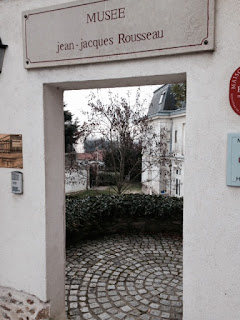
A beckoning path then leads the way to Rousseau's former residence.
I was the only visitor, and I think the museum guide truly had never presented her tour to someone who loved Jean-Jacques as much as I do. She showed me the little table where he would have breakfasted with his longtime companion Thérèse.
She led me to the "donjon" where he retreated to do his writing.
And she pointed out the desk at which he wrote
Julie. "We call this the Julie table," she told me. I clasped my hands over my heart.
Two large paintings, illustrating incidents from his books, hang in a front room. "This one shows a time that Rousseau and two of his friends--" she began. "The cherry picking scene from the
Confessions!" I squealed.
She knew me then as the devotee I am, and we fell into each others' arms. Well, so to speak.
I loved going so far, alone, with difficulty, to find Jean-Jacques in one of the few places where, for a brief time in his tormented life, he lived happily. Pilgrimage can be a communal affair, Chaucer's band of travelers on the road to Canterbury. But pilgrimage can involve a solitary journey as well, just me and Jean-Jacques and a kindly tour guide, sharing a sweet hour on a chilly January afternoon.
View Next 25 Posts


